Elephants are majestic creatures that have been captivating humans for thousands of years. Strong, powerful, family-oriented, and equipped with razor-sharp memories-elephants have been centerfold in countless cultural legends.
Elephant tattoos are very popular with various symbolic meanings in the Western world. But to truly understand the actual symbolic meaning of elephants, we have to look to the Eastern Hemisphere, where elephants actually live and have thrived for millennia.
Elephants live all over the Eastern Hemisphere and span many different cultures and religions from China to India to Africa.
In this article, we’ll take a deep look into the true symbolic meaning of elephants by gaining a deeper understanding from the perspectives of a variety of cultures.
Let’s Dive In.
A Little Background About Elephants

Elephants are among the most iconic creatures on earth for a reason. They weigh in as the largest of all land animals, and their huge anatomy and unique features are a sight to behold.
There are three distinct species of elephants, according to expert sources. The African Savannah Elephant, the African Forest Elephant, and the Asian elephant which are native to the savannahs, deserts, and rainforests of Africa and Asia.
These mammals are highly intelligent, something that’s only noticeable in a few other creatures such as primates (humans, chimpanzees, gorillas) and marine animals like whales and dolphins.
Although they boast of a long lifespan of up to 70 years in the wild, these animals are acutely endangered. Human encroachment and poaching for ivory have plummeted the elephant population significantly.
Symbolic Meaning of Elephants: 10 Symbolic Elements Explained
Humans and elephants have co-evolved and lived alongside each other for millennia.
Old and famous folklores speak highly of elephants just as they do mythical creatures like dragons, serpents, and the phoenix.
One of the best example’s of the legendary status of elephants lies in an ancient stone tablet from Greece stating that, “Plato told me that everything I need to know about life can be seen in elephants.”
We’ve admired their physiques, demeanor, and strength and even associated them with positive symbolic meanings.
What is it about elephants that continue to mystify and inspire us?
1. Intelligence And Consciousness
As humans, we owe our resourcefulness, dynamic nature, creativity, and adaptability to our brains, and so do elephants.
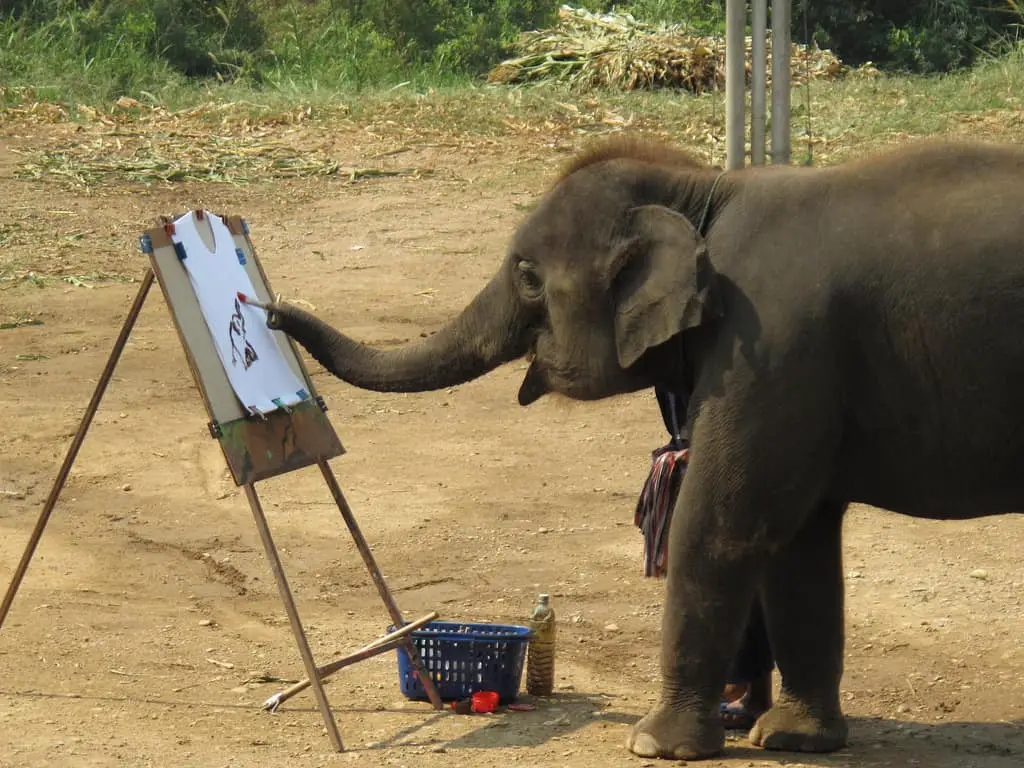
Elephants have the largest brain structures on earth, weighing over 11 pounds, with close to 300 billion neurons. The brain is not only three times a human’s but also the most complex to ever exist. It’s no surprise, therefore, that elephants possess impressive wit, cognitive prowess, intelligence, and self-awareness, just like us.
These beautiful creatures can distinguish between human age and gender, use tools, and solve complex problems. They are also capable of compassion, self-recognition in mirrors, and displaying emotions such as love and grief.
Experts suggest that elephants can even identify languages just by the sound of a person’s voice, a rare phenomenon in the animal kingdom.
So, sometimes, repetitive dreams, images, or thoughts about elephants remind you that you possess superior intellect and wit to solve the obstacles and problems in your life.
2. Wisdom And Memory
Ever heard of the saying, an elephant never forgets?” There might be plenty of truth to it.
These animals are highly intelligent with awe-inspiring memories.
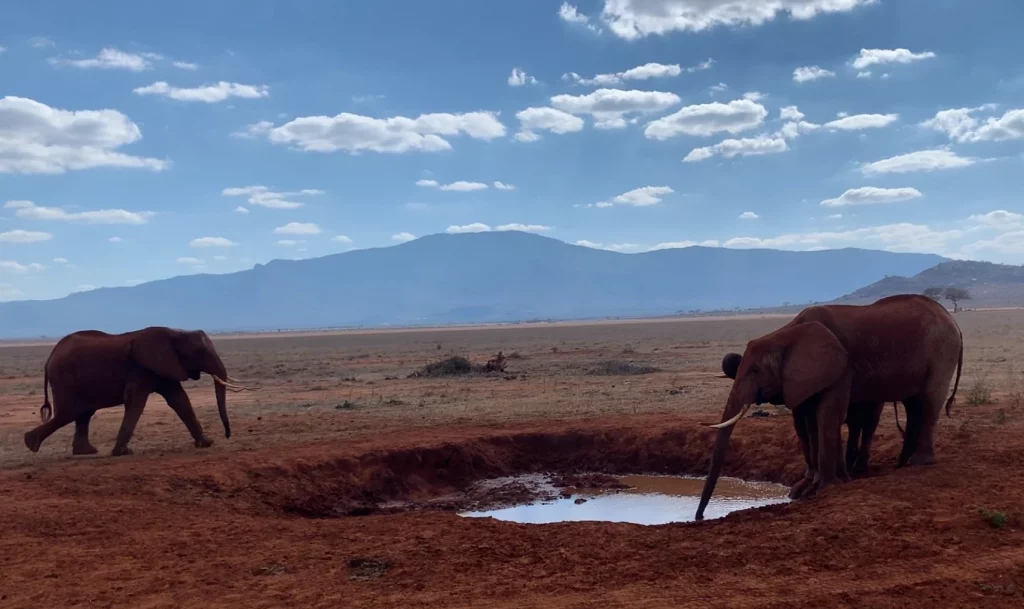
Elephants can remember their caretakers or friends they once interacted with even after long periods of separation. Their good memories also allow them to hold grudges against their past enemies. They can remember routes to water and food sources during prolonged drought periods simply because they have memories of using the same course in a previous drought season.
Of course, it’s human nature to want to associate only with good experiences and “block” out the negative moments of our existence. However, just like an elephant, we can create better lives for ourselves and others in the future if we choose the correct lessons from our past experiences.
3. Strength
Elephants symbolize strength and resilience in the most basic, universal meaning. They’ve been around for over 55 million years and co-evolved with other creatures that have long gone extinct.
Not that elephants were luckier than their kins. Their resilience, strength, and endurance gave them a survival advantage.
This type of strength refers to both body and mind. The elephant spirit or essence can inspire us to endure trying moments and stay resilient during difficult times that require patience.
4. Protection
These animals are gentle and graceful. But when it comes to it, they are super protective of themselves and their family.
Recurring elephant symbols remind us to become the elephant for ourselves and others. We can channel the bull elephants within us to protect those that need it if we ever pick-up a “bad vibe” from a situation or someone.
5. Power
While elephants can be destructive and aggressive to exert their power if they want to, they choose to be patient, gentle, and graceful.
Elephants symbolize that we can still be powerful and bring out our best versions of ourselves through our strengths and abilities. We can earn respect and even inspire others by being more aware of the power within us, and doing so without compromising the standards we’ve set for ourselves.
6. Family Love
These graceful land animals are social beings and thrive in parental care, community, and tribe just like we do. They spend most of their lifetime living in close-knit family groups led by female elephants.
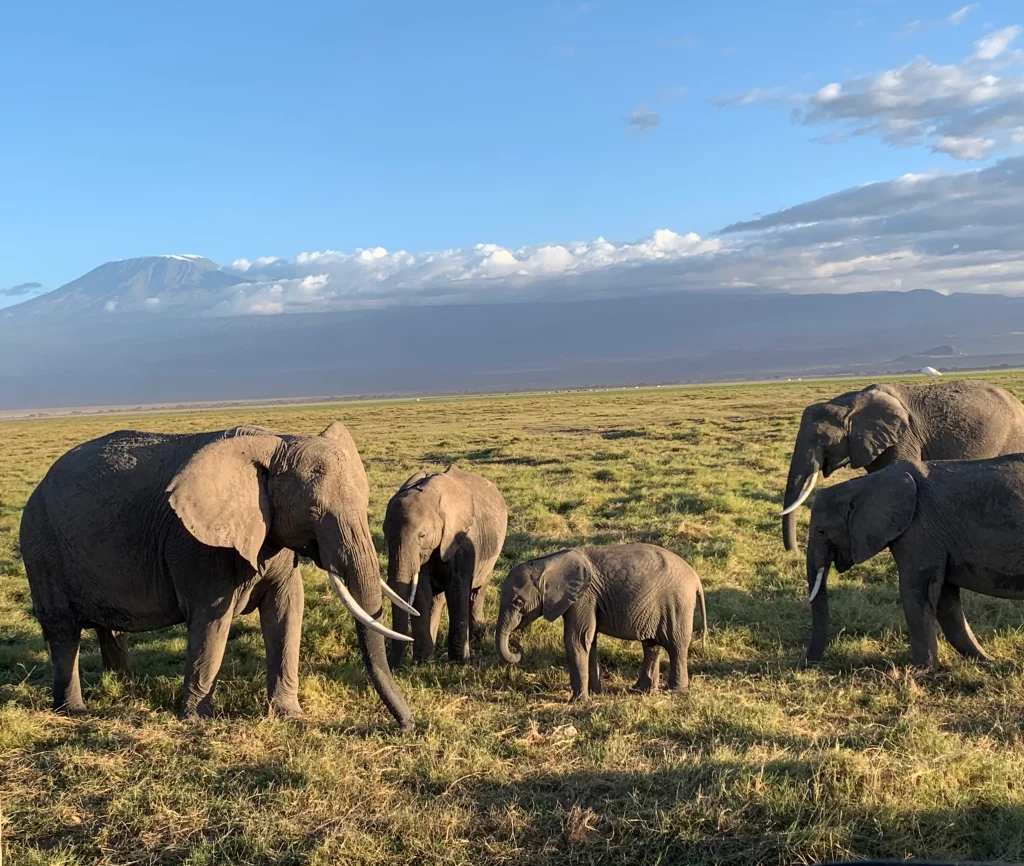
The elephant symbol offers insight into how we treat those dearest and closest to us. It allows us to understand what love, family, and friendships entail.
7. Loyalty
Elephants display intimacy, teamwork, and loyalty to those they cherish, whether they are biologically related or not.
These beautiful giants may not be naturally monogamous, but they honor relationships and even mourn their loved ones. Elephants comprehend the importance of belonging.
We are reminded to find those worthy of our loyalty and love. Call, visit, and devote your time, effort, and attention to those that reciprocate whenever you can.
8. Patience
Elephants are graceful, mellow, slow to anger, and calm creatures. Their females also have the most prolonged gestational periods, up to 22 months, before they bring forth beautiful calves.
The synchronicity of the elephant symbol asserts the importance of employing calmness, patience, and stability in conditions that might demand otherwise.
9. Good Luck
It’s common to find elephant symbolism within a household in Southeast Asian and Indian cultures. These communities worship the elephants and believe that items such as elephant wall art, jewelry, and statues in strategic places invite prosperity and fortune.
Perhaps, your subconscious could be preparing you for a good fortune if you start noticing repetitive elephant symbols.
10. Peace
An elephant’s gentle and tranquil nature can teach us something. We can choose to be wise and stay humble and patient for peace’s sake despite our sizes, power, and position.
Symbolism Behind An Elephants Color
Elephants are typically gray. However, they may appear symbolically in other colors, such as white, black, and golden, either in artwork or in dreams.
● White Elephant Symbolism
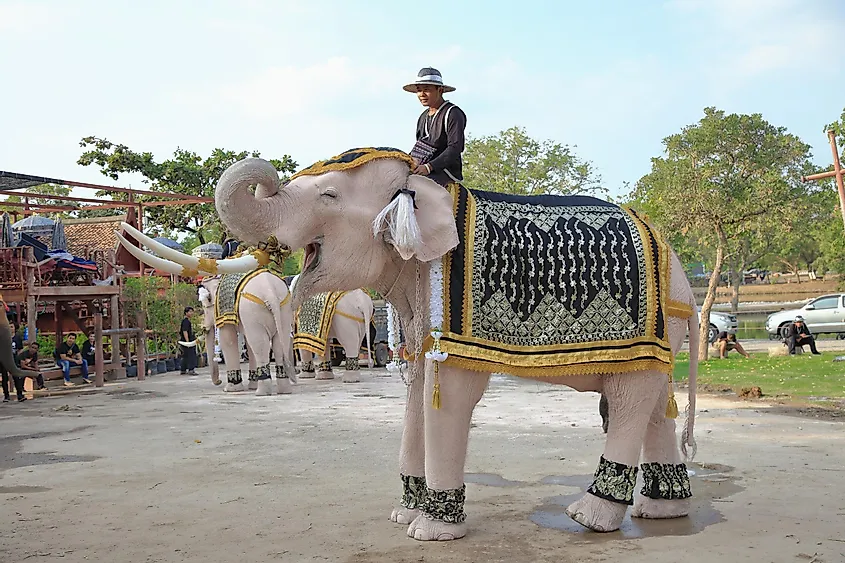
The color white represents all things fresh, renewed, and pure. Similarly, in most cultures, a white elephant is a sacred symbol held in similar regard to gods and goddesses.
It signifies good tidings, enlightenment, and spiritual purity in Buddhism; good fortunes and nobility for Thai, Burma, Cambodia, and Laos cultures; and rain for India.
● Black Elephant Meaning
Although individuals associate the black color with darkness, despair, or pessimism, a recurring black elephant symbol should be celebrated. Seeing one in a dream, a drawing, or any other place should prepare you for imminent triumph.
It means that you’ll overcome hurdles and emerge as a renewed person from the other side of whatever situation you face.
● Golden Elephant Meaning
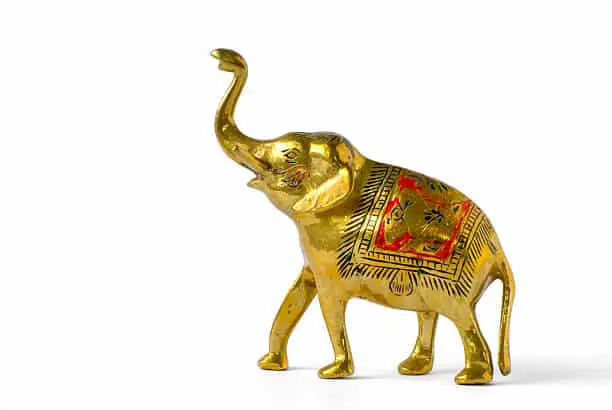
We admire the color gold, associating it with affluence, affection, and magic. On a deeper level, a golden elephant still symbolizes positivity, including good luck and bountifulness.
A golden elephant is associated with welcoming the desired manifestations into your life.
Cultural Meanings of Elephants
African Elephant Meanings
Most African folklore and cultures honor this animal as a wise chief and king of the animal kingdom who’s able to solve issues among jungle creatures.
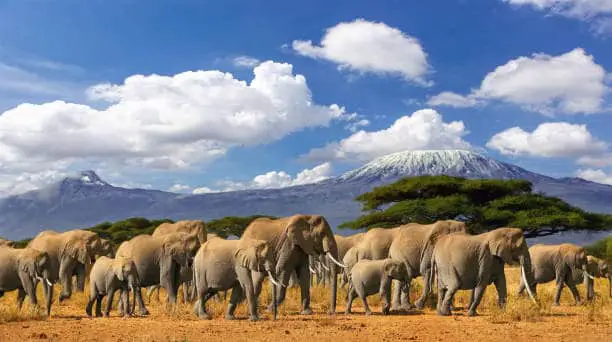
African elephants symbolize royalty and wisdom. The Ashanti tribes even accord dead elephants befitting burials because they believe they are their reincarnated leaders.
South African tribes use elephant tusks on their shields because the animals represent eternal power.
Cote d’Ivoire tribes, on the other hand, have elephant heads on their shields, symbolizing power, strength, and wisdom.
Elephant Meaning In Asia
Asian tribes and elephants have been able to coin a unique relationship. Asians domesticated, tamed and trained these beautiful creatures for transportation, logging, and warfare.
The majestic beasts were also central among many Buddhist, Hindu, Thai, and Burmese religions. They were bringers of fortune and sacred representations of peace, power, and prosperity.
It’ll be hard to miss elephant symbolisms during temple rituals, artwork, and religious events because they embody their gods.
The Significance Of Elephants In Mythology And Religion
Elephant Symbolism In Buddhism
Buddhism’s symbolism, legends, folklore, and beliefs surrounding the elephant assign this animal unmatched spiritual and cultural significance.
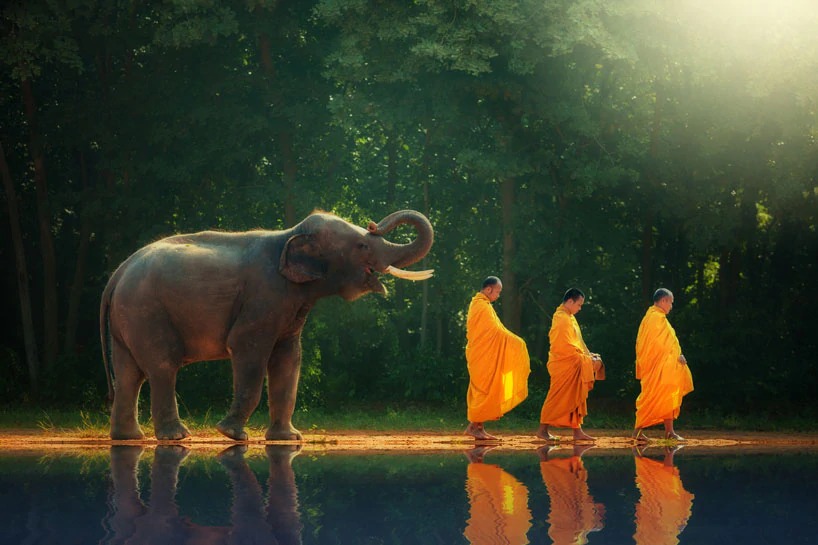
Elephants, especially white elephants, represent mental purity and divinity and are a spiritual equivalent to God in Buddhism. They signify the rebirth of Buddha, the enlightened being.
It all starts with Buddha’s birth, when his mother, Queen Maya, only conceives after she dreams of a white elephant. The white elephant offers the queen a white lotus flower while circling her thrice before entering her body.
Elephant Symbolism In Islam
According to Islam’s legendary view, the Prophet Muhammad was born in 570 CE, the “Year of the elephant.” Islamic legend also suggests that an Elephant army, under the command of Abraha, a Yemen ruler, intended to conquer Mecca and destroy the Kaaba.
However, the plot did not materialize as Mahmoud, the white elephant that the Yemen leader rode, could not advance into the holy Mecca.
Elephant Symbolism In India And Hinduism
Scores of Hindu legends, rituals, and myths usually depict that elephants are iconic and have been well-loved since the beginning of time. The Hindu faith considers this animal sacred and is even among its most powerful and favorite gods.
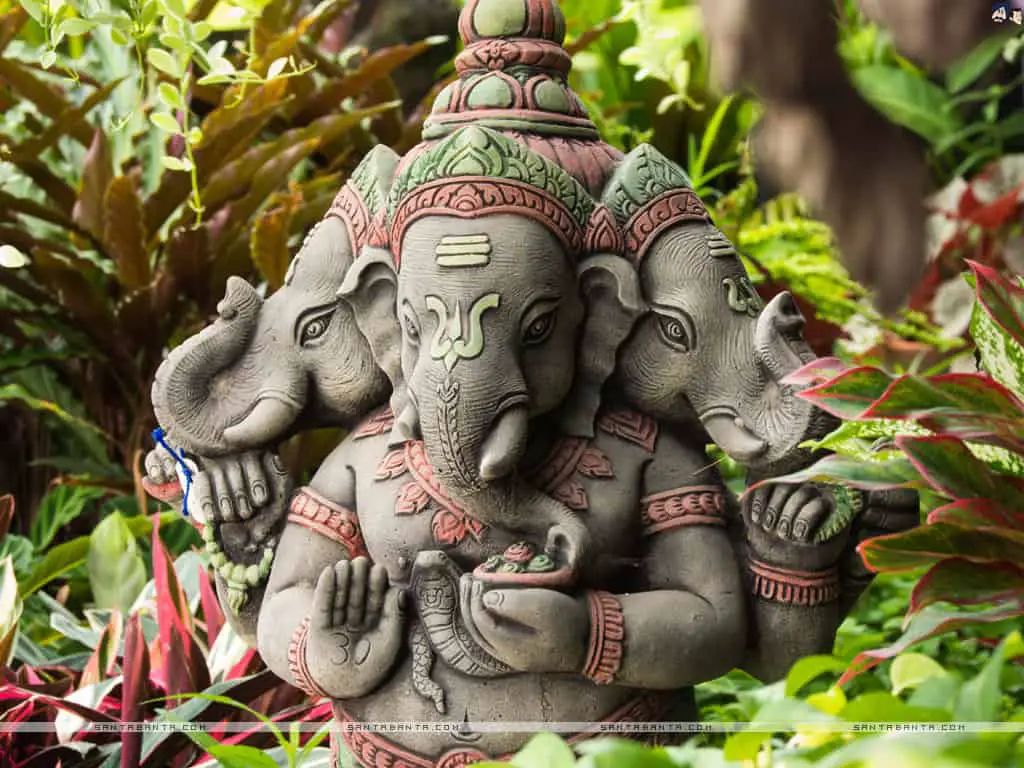
Hinduism depicts the enigmatic god “Ganesha” as elephant-headed. Half of Ganesha’s body takes the elephant form while the other is in human form.
According to Hinduism, Ganesha, the god of good tidings, is responsible for removing obstacles and providing a path to affluence, good health, and success.
Elephants also represent rain and water. They symbolize the interrelatedness between heaven and earth, mainly since Hindu mythology always depicts God Indra, the god of weather, river courses, lightning, rain, and thunderstorms riding on a white elephant.
Similarly, kings rode on elephants during processions, giving these animals a symbolic meaning of royalty, peace, and power.
Christianity & Elephants
And what does an elephant symbolize in Christian stories?
The bible and ancient Christian artworks mention elephants directly. These gigantic animals embody temperance, self-restraint, grace, moderation, wisdom, and intelligence, relating to the power of prayer and faith in God.
Elephants also symbolize strength in body and mind. These animals are at liberty to take advantage of others and situations or be destructive. However, they are gentle, compassionate, and patient because they exercise self-control, a positive trait that the bible encourages Christians to observe.
Elephants in Ancient Egypt
Elephants represented royal prestige during Egypt’s predynastic period. Ivory jewelry, rock art decorations, and pottery items indicate that elephants thrived and held ritualistic and religious importance during this era. Ancient Egyptians considered these creatures as supernatural entities and even worshiped them.
Elephants also played a vital role in Ancient Egypt’s victory in warfare by helping to trample and intimidate foes in battles.
The Meaning of Elephants in Feng Shui: 4 Examples
What is Feng Shui?
Feng Shui translates to “wind”(Feng) and “water”(Shui) in Chinese. It is an ancient Chinese cultural art practice of how we can arrange our living (or work) space to create harmony and balance.

Feng Shui isn’t only about achieving harmonious environments. It’s also about how we align the energy forces between us and our environment. It is about a “conscious occupation,” existential mindfulness, and how to attune to our elements.
The elephant symbol is one of these energy forces. In feng shui, we can experience an elephant symbol’s supernatural gifts depending on how and where we place them.
Here’s the best elephant symbol placement in a home according to feng shui.
1. Entrance-Protection or Guardianship
Elephants participated in warfares in most ancient cultures. So, those seeking divine protection for their homes can place two outward-facing elephant statues at the home’s entry points. A pair of mighty elephants protects and maintains balance in a house by preventing the loss of chi.
2. Good Luck
An elephant figurine in a home welcomes good luck. Large elephant imageries for a wide entrance or tiny statues at a desk at your office invite in positive energy, energizing a home or career as long as they face inwards.
3. Bedroom-Harmony between Couples
The direction, angle, and location of a feng shui elephant in a bedroom determines the energy flow in the union. A pair of elephant statues, wall hangings of elephants with their trunks upwards, and pictures on pillow covers can help create a balanced, healthy, and harmonious matrimony.
4. Children’s Room
A mother can channel a stronger bond between her and her children if she places a painting or statue of mother and child elephants in her children’s room. c
Similarly, elephants represent nobility, bountiful harvests, and prosperity. A feng shui elephant symbol in pillow covers, statues, wallpaper, or other collectibles on your child’s study tables can help affirm your child’s knowledge and help improve their studies.
Meaning of Elephant Symbolism With Trunk Up vs. Trunk Down
Which direction should an elephant’s trunk face in your home? What does it mean when the trunk position is up or down?
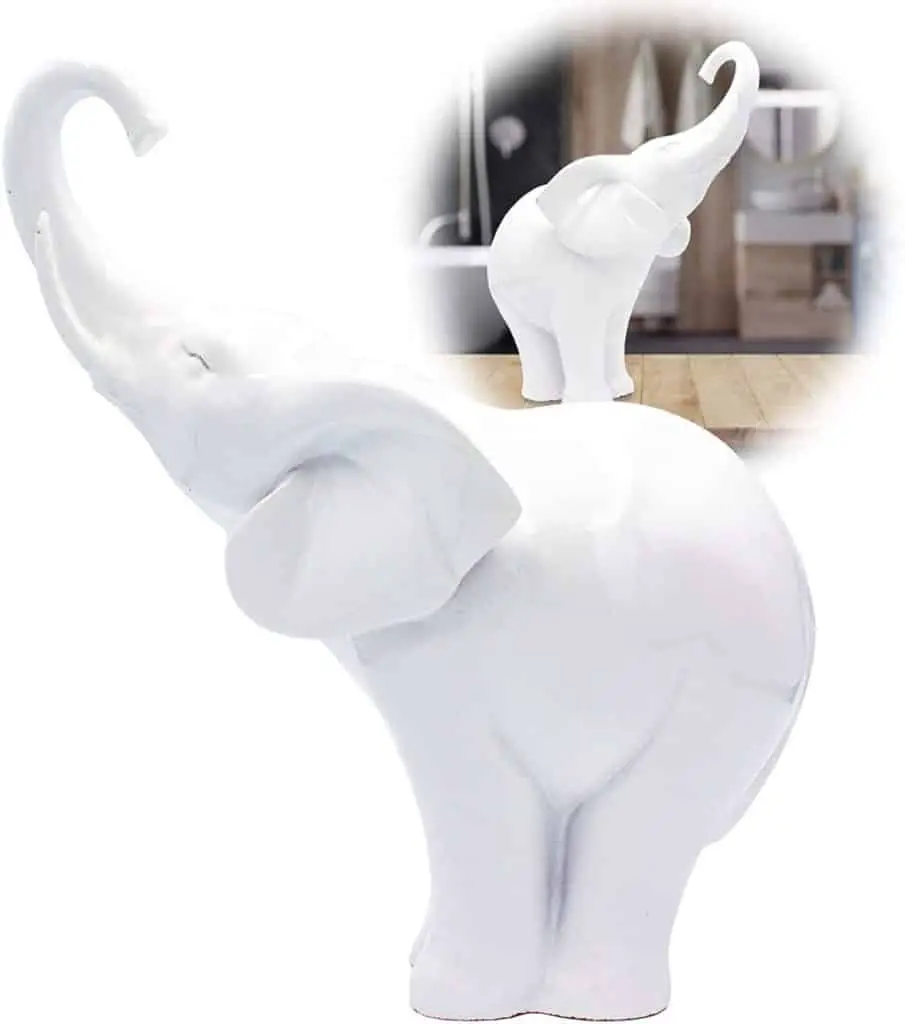
Should you need a feng shui elephant figurine in your space for best of luck, ensure that the trunk’s direction is appropriate.
The feng shui concept suggests that an upturned elephant trunk in a family home signals good luck, strength, prosperity, and insurance. Some people believe that if a feng shui elephant trunk is facing upwards, blessings and good luck will pour down on them.
No. A downward-facing feng shui elephant trunk does not necessarily carry a bad rap for misfortune. Instead, it signifies introspection, child-bearing, centralized energy, and the ability to solve problems as they come.
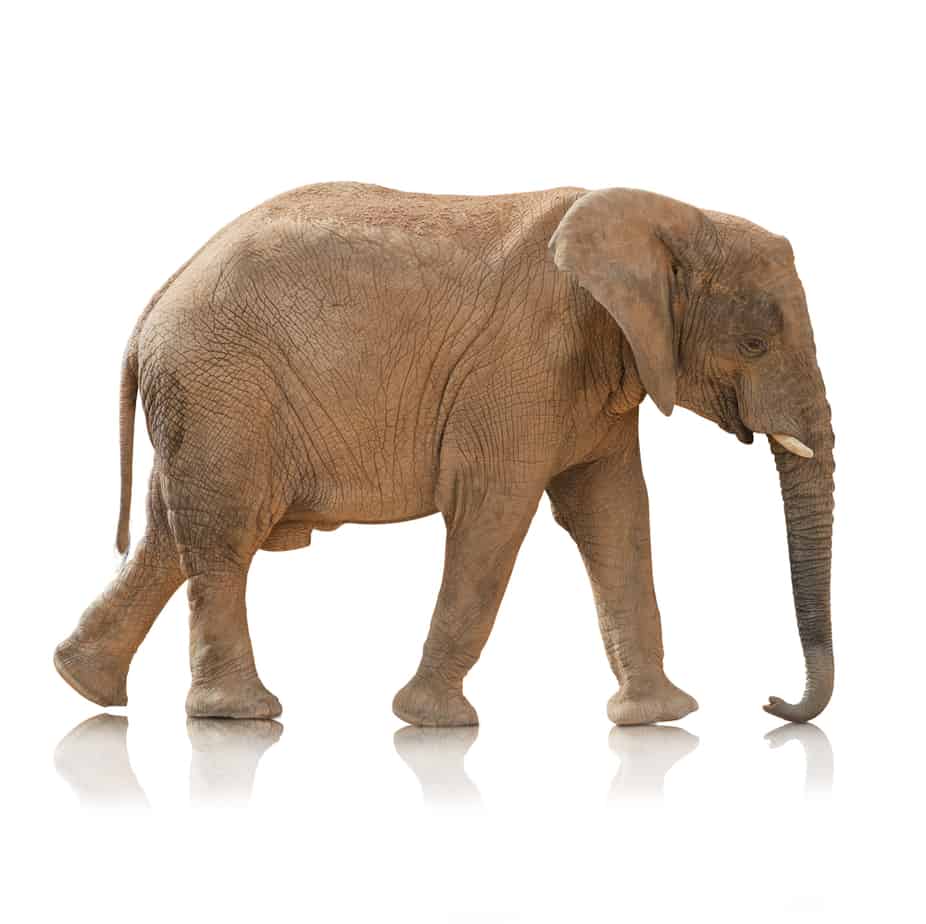
The feng shui philosophy recommends placing a duo of elephants with their trunks down if lovers desire sensuality, passion, or they want to conceive a child.
Take your pick—up or down?
“Elephant In The Room” Meaning
Iran Krylov coined the proverbial” elephant in the room” in the year 1814 through his fable ‘The Inquisitive Man.’ The story talks of a man that goes to a museum. He recalls noticing other tiny and trivial things except the elephant.
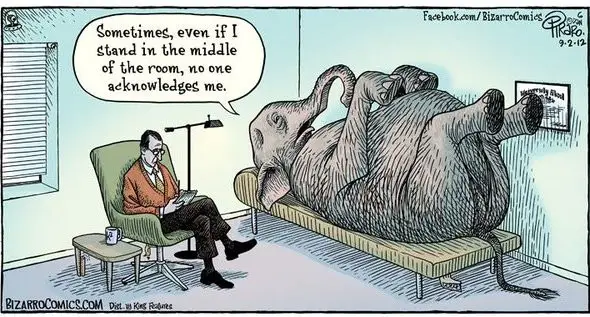
This metaphorical phrase addresses something or a topic as huge, prominent, and conspicuous as the elephant ( the largest of all land mammals) but tends to be overlooked because of its sensitivity.
It refers to the irony of ignoring a critical discussion or issue that we are well aware of just because it is uncomfortable, difficult, awkward, or will stir controversy.
Final Thoughts: Symbolic Meaning of Elephants
Symbols and recurring experiences are just ways our subconscious tries to communicate with us, bringing what we ought to know to our attention.
Attributes like intelligence, wisdom, composure, power, strength, and endurance are but symbolic meanings of elephants on a fundamental level.
Let’s look at it on a deeper level. We can understand that it’s only when we cultivate these attributes in our human minds and break our own evil habits, attitudes, and personality traits that we can achieve optimum versions of our lives.
What belief or ritual do you turn to for support whenever you face unprecedented times in your life? Perhaps, it’s time to start paying attention to the elephant symbols around you.
Check Out Our Other Interesting Articles About Symbolism
- The Flower of Life: Symbolism, Meaning & Origin Explored
- The Lotus Flower Meaning | Symbolism & History
- Archangel Metatron’s Cube: History, Origin & Symbolism
- The Namaste Symbol | Om Symbol Meaning | Yoga Symbols
- Tree of Life Symbol: Meaning & Origin
- The Meaning Behind The Freemason Symbol: History & Origin
- The Dharma Wheel Meaning: Origin Explained
- The Ankh (unk) Symbol: Ancient Egyptian Meaning
- Elephant Symbolism & Meaning Explained
- Scarab Beetle Symbolic Meaning | History & Origin
- Symbolism, Meaning, and Origin of The Serpent
- What Are Sacred Geometry Symbols & Meanings
- What Is The Egyptian Eye Of Ra ? Symbolism Explained
- The Eye of Horus vs. The Eye of Ra | Meaning
- What’s Your Third Eye? How To Open It ?
Loved what you read?
Hit that share button and let the world in on the secret – we’d be thrilled!
Got thoughts? We’re all ears for your feedback, corrections, or a good old chat. Don’t be shy; drop us a line.
And hey, don’t miss out on our curated list of must-reads in the recommended books section.
Big thanks for diving in with us today!




